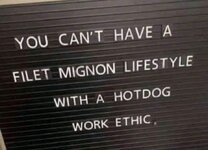Silver Supporter
- Messages
- 721
- Reactions
- 1,422
I saw an interview on tv years ago where the owner of a bunch of McD's franchises in Japan was asked if there was milk or cream was in a milkshake.
He said no. "No dairy in milkshake."
He said no. "No dairy in milkshake."






















